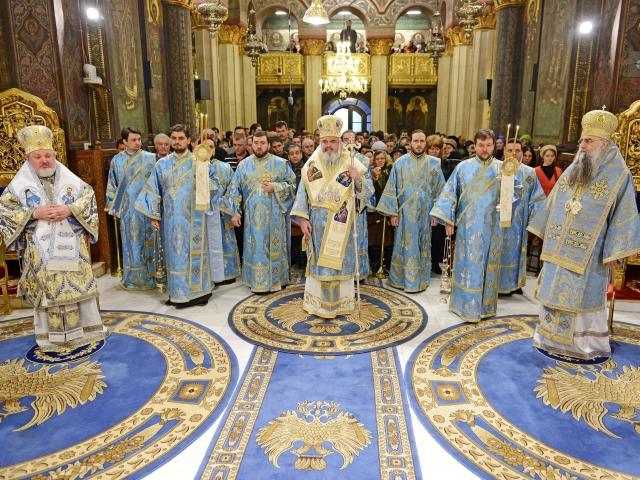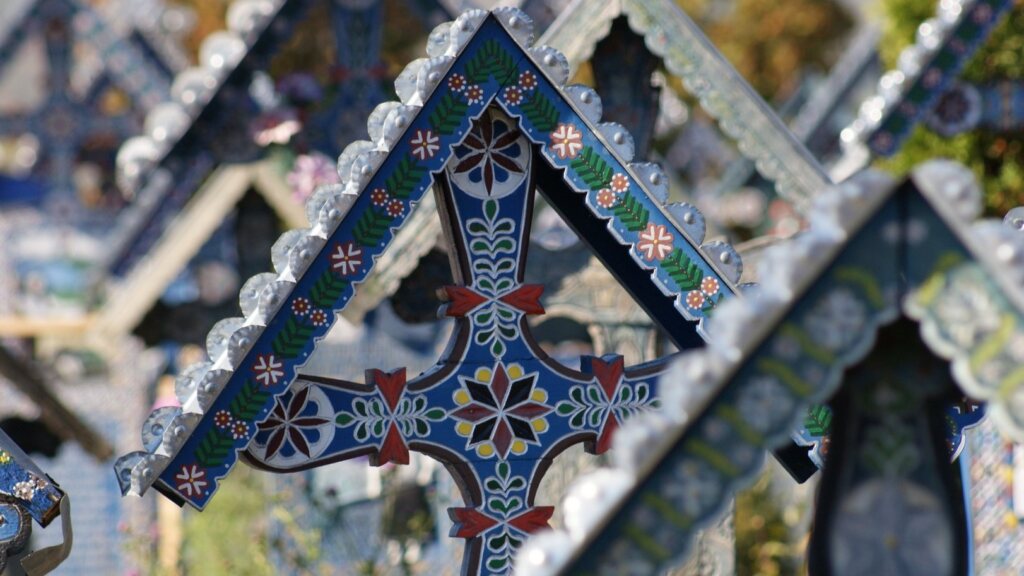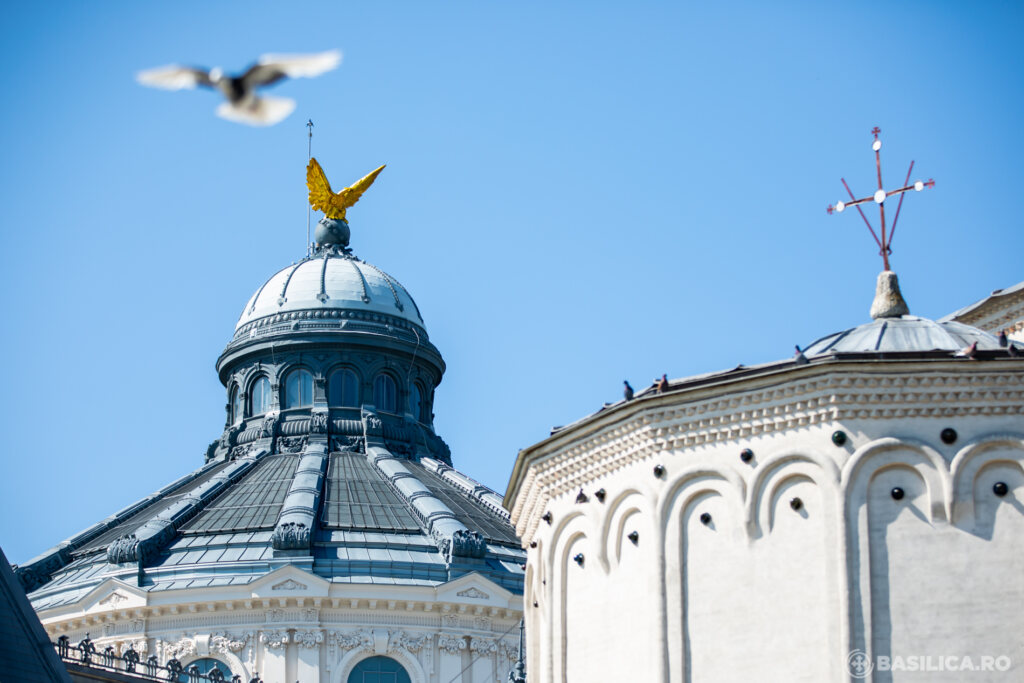On 6 January, the Orthodox Church celebrates the Baptism of the Lord. The feast reminds the Baptism of Jesus Christ, our Saviour, in the river Jordan, and his recognition as Messiah by Saint John the Baptist. The Evangelical pericope of Saint Matthew the Evangelist chapter 3:13-17 was read at the Divine Liturgy on the feast of the Baptism of the Lord: “Then Jesus came from Galilee to the Jordan to be baptized by John. But John tried to deter him, saying, “I need to be baptized by you, and do you come to me?” Jesus replied, “Let it be so now; it is proper for us to do this to fulfill all righteousness.” Then John consented. As soon as Jesus was baptized, he went up out of the water. At that moment heaven was opened, and he saw the Spirit of God descending like a dove and alighting on him. And a voice from heaven said, “This is my Son, whom I love; with him I am well pleased.”
The Patriarch of Romania celebrated the Divine Liturgy at the Patriarchal Cathedral.
On this feast day, His Beatitude Daniel, Patriarch of the Romanian Orthodox Church celebrated the Divine Liturgy at the Patriarchal Cathedral. His Beatitude celebrated together with His Grace Varlaam Ploiesteanul, Assistant Bishop to the Patriarch and Secretary of the Holy Synod, and His Grace Varsanufie Prahoveanul, Assistant Bishop to the Archdiocese of Bucharest, as well as with the priests and deacons of the Patriarchal Cathedral.
After reading the evangelical pericope, His Beatitude delivered a sermon in which he explained the meaning of the Gospel fragment read during the Divine Liturgy. His Beatitude emphasised three great truths of the respective text of the Gospel according to Matthew. The Primate of the Romanian Orthodox Church spoke about the never ending lowliness of Jesus Christ who although had no sin went to receive the baptism of repentance from Saint John the Baptist. At the same time, His Beatitude underlined that the One who goes to be baptised in the river Jordan is not an ordinary man, but the Son of the eternal God who was made Man out of love for humans and for their salvation. The Patriarch of Romania has also shown the fact that whatever Jesus Christ, our Lord, does as Saviour, reveals the unlimited love of the Most Holy Trinity.
His much lowliness and justice – namely the accomplishment of the iconomy or plan of salvation of God – is shown in His coming to John to be baptised with the baptism of repentance
Although Jesus Christ, our Saviour, has no sin, He asks for the baptism of repentance to show His complete lowliness and the fact that He will take the sins of the world over Him. He took the sins of the world over Him, and showed that they are the consequence of the humans’ disobedience and alienation from God and healed the human nature of disobedience and alienation from its Creator.
“Therefore, the baptism of repentance for forgiving the sins was a preparation for feeling the need to have the sins forgiven and renew the life. Christ, the Lord, comes close to John, and John tells Him, hesitating to baptise Him “I need to be baptized by you, and do you come to me?”, but Jesus insists and tells him “Let it be so now; it is proper for us to do this to fulfill all righteousness”. What is righteousness in this sense? It is God’s plan for the salvation of the world achieved through the Son, through everything He does and says. Although Jesus Christ has no sin, He asks for the baptism of repentance for sins not only to show His complete lowliness, but also to show that He will take the sins of the world over Him. This is why, on another occasion, Saint John the Baptist confesses that Jesus Christ is the Son of God who takes the sins of the world over Him; He took them over Him, and showed them that they were a consequence of the alienation of the humans from God and disobedience to God, but He was obedient till death and even on the death on the cross, and this is why He healed the human nature from disobedience, from the alienation from God. He takes the sins of the world over Him and shows through His sacrifice on the Cross and Resurrection from the dead an obedient nature to God which becomes later on, through Resurrection, participant – the human nature – in the eternal life, love, and glory of the Most Holy Trinity. Thus, His much lowliness and righteousness – namely the accomplishment of the iconomy or God’s plan for salvation – is shown in His coming to John to be baptised with the baptism of repentance for forgiving the sins. At the same time, this righteousness of the plan of God is also reflected in the fact that Jesus is introduced now to the crowd by Saint John the Baptist”, His Beatitude said.
Great Blessing of Waters
After the prayer of the pulpit the group of celebrant priests came out of the Patriarchal Cathedral, and the Primate of the Romanian Orthodox Church, His Beatitude Daniel celebrated the Great Blessing of Waters (Great Holy Water), in front of the Patriarchal Cathedral.
After saying the troparions which remember the Baptism of the Lord: The Voice of the Lord cries over the waters…, Today the waters are blessed…, You came to the river like a man…, To the voice of the one who cries in the wilderness..., three paremias were said, all of them from the prophecies of Isaiah (chapters 35:1-10; 55:1-13 and 12:3-6). Then, the Apostle of the 1st Epistle of Saint Paul the Apostle to the Corinthians was read, chapter 10:1-4, and the Holy Gospel according to Mark, chapter 1:9-11, which briefly relate about the Baptism of the Lord. There followed the Great Litany which included special invocations for the blessing of the water, while the prayer Jesus Christ, our Lord, One born Son… was said in a low voice. Then the prayer written by Saint Sofronie of Jerusalem to the Holy Trinity was read: Trinity higher than nature... The words: Great are You, o Lord, and wonderful are your things, were said three times in the run, louder than usual. The words for the invocation of the Holy Spirit to bless the water were said three times: You Yourself, Emperor and Lover of people, come and bless this water descending Your Holy Spirit, were said three times and the water was blessed three times, dipping the hand cross like in the water, in each of the vessels. The words: Now, Master, bless this water with Your Holy Spirit were also said three times, and every time the water was blessed cross like.
There followed the prayer Listen to us, Lord, said in a low voice… Then the Holy Cross and the bunch of basil were dipped in the vessels of water making the cross sign three times. Then, the Patriarch of Romania splashed those present at the Joy Hill with holy water, while singing the troparion entitled You were baptised in the Jordan, o Lord.
To end with the religious service, His Beatitude Daniel, Patriarch of the Romanian Orthodox Church delivered a sermon for those present and spoke both about the Great Holy Water and about the feast of the Baptism of the Lord.
“First of all it (the Holy Water) is given for the purification and blessing of the body and soul, for removing the bad powers, for good health and for making for the Kingdom of Heaven. The Patriarch of Romania spoke about the qualities and blessings of the Great Holy Water. The Kingdom of Heaven means eternal life and we drink this holy water, the Great Holy Water, for 8 days because number 8 symbolises eternity. Thus, the Baptism opens the gates of the eternal life for us, and this is why this water is given for blessing, for the fruitful gifts received at the Baptism and our permanent effort to get the Kingdom of Heaven”, His Beatitude said.
His Beatitude Patriarch Daniel also said that today the nature of the water is changed.
“We see how Christ, our Lord, wants to bless not only our souls, but also the whole nature around, all the creation of God to remember us that the earth, water, air, are all gifts of God for us. All this shows us the merciful love of God who urges us to thank Him, to be grateful to Him, and thank Him for kindness”, the Patriarch of Romania said.






